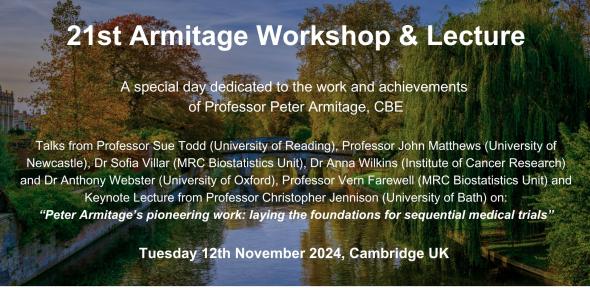
This year’s workshop will be a particularly special occasion as it will be dedicated to the work and achievements of Professor Peter Armitage, who sadly passed away in February 2024 at the age of 99. There will be sessions on sequential trials and multi-stage theory of carcinogenesis which Peter was a pioneer in.
The keynote lecture will be delivered by Professor Christopher Jennison from University of Bath, on:
“Peter Armitage’s pioneering work: laying the foundations for sequential medical trials”
Abstract: In a sequentially designed experiment, data are evaluated as they are collected and sampling is stopped as soon as the required amount of information is reached or the outcome of a hypothesis test is determined. Formal use of sequential methods dates back to the 1920s and applications of statistical quality control in manufacturing processes. Methods were developed further during the second world war with the work of Abraham Wald in the USA and George Barnard in the UK. Peter Armitage led the way in transferring sequential methods to medical studies and, after several journal articles, published the book “Sequential Medical Trials” in 1960. Key features of medical studies, as opposed to industrial experiments, are the restriction to a small number of interim analyses and a modest limit on the maximum sample size. These practical requirements led to methods based on the precise numerical computations that Peter Armitage and his co-authors presented in the 1960s. In my talk, I shall survey the many directions in which sequential methods for clinical trials have developed over the past 60 years. Topics such as optimal design, response adaptive randomisation, and inference on termination of a sequential trial were already studied by Armitage. Other topics, in particular adaptive designs with multiple hypothesis testing, have emerged more recently. Peter Armitage made immense contributions to the development of methodology for clinical trials: it will be my privilege and my pleasure to describe Peter’s role in the history of this subject.
Programme
| 09:20 - 09:40 | Registration and Refreshments | |
| 09:40 - 09:50 | Welcome |
Dr Brian Tom, MRC Biostatistics Unit |
| 09:50 - 10:25 |
"Peter Armitage: innovator, mentor and friend" |
Professor John Matthews, University of Newcastle |
| 10:25 - 11:00 | "Peter Armitage: Some last words on clinical trial design and analysis" | Professor Vern Farewell, MRC Biostatistics Unit |
| 11:00 - 11:20 | Refreshments | |
| 11:20 - 11:55 | "Multistage models of disease" | Dr Anthony Webster, University of Oxford |
| 11:55 - 12:30 | "Does Armitage's multi-stage theory of carcinogenesis hold up 70 years later?" | Dr Anna Wilkins, Institute of Cancer Research |
| 12:30 - 13:30 | Lunch | |
| 13:30 - 14:05 | "Revisiting Armitage's search for optimality in clinical trials: What has changed and what remains the same?" | Dr Sofia Villar, MRC Biostatistics Unit |
| 14:05 - 14:40 | "Implementing adaptive designs in the 21st Century" | Professor Sue Todd, University of Reading |
| 14:40 - 15:00 | Refreshments | |
| 15:00 - 15:10 | Introduction of Armitage Lecturer | Professor John Whittaker, MRC Biostatistics Unit |
| 15:10 - 16:20 |
21st Armitage Lecture: “Peter Armitage’s pioneering work: laying the foundations for sequential medical trials” |
Professor Christopher Jennison, University of Bath |
| 16:20 - 17:00 |
Drinks Reception |
|

